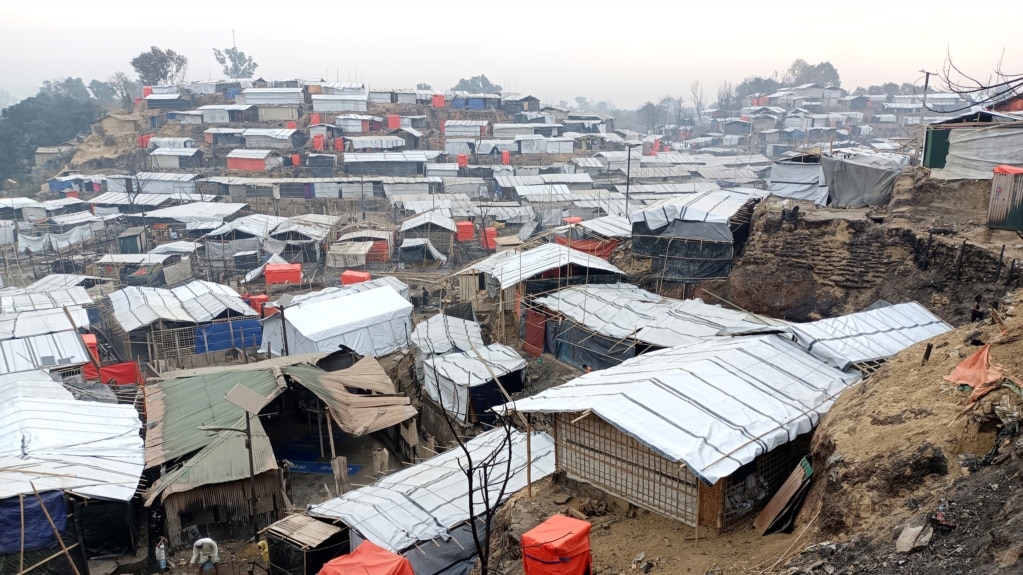International experts and rights activists are condemning a second reduction in food aid to more than one million Rohingya refugees in Bangladesh.
The United Nations World Food Program (WFP) cut its monthly food rations for the group from $10 for each person to $8 last month. The agency said it was forced to take the action because it did not have enough money to support additional aid.
The WFP had already reduced the monthly food aid to Rohingya this year. It went down from $12 to $10 per person in March.
'Many will starve now'
The World Food Program said it was experiencing a $56 million shortfall, which led to the latest cut in rations.
Dom Scalpelli is the WFP resident representative and country director in Bangladesh. He said in a statement that the United Nations food agency was appealing for "urgent support" to be able to return to the full amount of aid as soon as possible. He said that without the full support, the refugees’ nutrition, safety and security in the camps will suffer.
Abdul Kalam is a Rohingya living at Balukhali camp in Cox's Bazar. He said the latest cut is a "terrible blow" to the refugee community in Bangladesh.
"Trying to manage their families — many will starve now," he said.
Gwyn Lewis is a U.N. resident official in Bangladesh. She said last week, "We are extremely concerned that WFP has been forced to cut aid for the Rohingya refugees in Bangladesh.”
She added that the food cuts will be especially “devastating” for Rohingya women and children in the camps. “We urgently appeal for international support," Lewis said.
Rice, lentils, oil
At least 700,000 Rohingya fled to Bangladesh from neighboring Myanmar in 2017. They joined about 300,000 others who had fled Myanmar security forces attacks their homes and villages in earlier years.
The Bangladeshi government mostly bars the refugees from leaving their refugee camps. As a result, the Rohingya there are completely dependent on WFP food aid.
The refugees live in small, temporary shelters made of plastic and wood in very crowded conditions near the coastal city of Cox's Bazar. The refugees say that the $12 in monthly food aid that each person used to get was already very limited, as they were forced to survive on staples such as rice, lentils and oil. Most suffer from malnutrition, they add.
"We are not provided with any clothing assistance from any organization,” said Kalam, the refugee who lives in Balukhali camp. As a result, he told VOA, he sometimes sold his food aid to buy clothes or meat or fish for his family.
“After the food aid has been cut by one-third, we are going to face a terrible level of hardship from this month," the 42-year-old said.
Abu Jafar is another Rohingya refugee. He noted that aid is going down while food costs go up. "Prices of many food materials have doubled over the past three years,” he said. “There is no way to escape starvation."
'Not just a matter of hunger'
Htway Lwin is a Rohingya community leader and human rights defender who lives in Cox’s Bazar. Lwin noted that "the reduction of food assistance for Rohingya refugees is not just a matter of hunger."
Lwin told VOA it would lead to increased violence and crime in the camps, including human trafficking of refugees.
"Ultimately, we are going to be forced to make unimaginable choices to survive, compromising our dignity and future. This is not the way any human being should be forced to live," Lwin said.
John Quinley is director of the human rights organization Fortify Rights. The organization works among the Rohingya. He told VOA that the food aid cuts are extremely harmful, especially for children.
"There are already high levels of malnutrition in the refugee camps in Bangladesh," Quinley noted.
"Bangladesh is restricting refugees' right to work." Quinley said. “Donor governments must commit funds to Rohingya response, including ASEAN and OIC countries."
ASEAN refers to the Association of Southeast Asian Nations. OIC is the Organization of Islamic Cooperation.
Phil Robertson is deputy director of Human Rights Watch's Asia division. He called the situation “shocking.” He said the international community broke its promise to the refugees.
"The Rohingya are increasingly stuck between a rock and a hard place as international donors act to wash off their hands and move on to the next tragedy," he said.
I’m Caty Weaver. And I'm Ashley Thompson.

